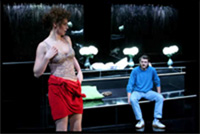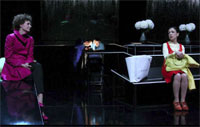Croatian House of Culture – 6. 5. u 6.00 p.m.
Zagreb Youth Theatre, Zagreb, Croatia
Jon Fosse: NIGHT SINGS ITS SONGS
Directed by: Dino Mustafić, translated by: Stephanie Jamnicky and Dora Maček, dramaturge: Željka Udovičić, set design: Dragutin Broz, costume design: Doris Kristić, music: Frano Đurović, scenic movement: Damir Klemenčić, light design: Aleksandar Cavlek, photographer: Demirel Pašalić
Cast: Nina Violić (Young Woman), Frano Mašković (Young Man), Doris Šarić Kukuljica (Mother), Damir Šaban (Father), Danijel Ljuboja (Baste)
First night: 15. 2. 2008. Duration: 90 min.


Norwegian author Jon Fosse (Haugesund, 1959) made his literary debut with the postmodernist novel Red, black in 1983, and by the middlle of 1990 when he debuted as a playwright, he was already acknowledged as an essayist, poet and prose writer. During the last ten or so years he wrote some thirty-odd dramas, recognizable for their sparing, minimalistic expression, through which he dissects the relationships in the closed microworlds of families. Ostermeier's production of his drama The Name is usually considered as the crucial moment of Fosse's entrance on the world stage; the play's first public performance took place in the year 2000, as a co-production by Berlin's Schaubuhne and the Salzburg Festival. Since then, Fosse's plays have been translated into more than forty languages, and each year some one hundred stages the world over are setting scenes for their production. Their author has in the meantime been awarded a series of reputable prizes (the Norwegian Ibsen Prize, the Austrian Nestroy Award and others), but he also won the flattering "title" of being the new Ibsen, with which his countrymen honored him.
The drama Night Sings Its Songs had its first public performance in 1997, and in 2004 German director Romuald Karmaker made a movie based on this play. The Croatian premiere bears the signature of Dino Mustafić, a director from Bosnia and Herzegovina, theater pedagogue as well as restorer and manager of the prominent Sarajevo Festival MESS. On occasion of the Rijeka Festival in 2006, Mustafić was guest with Sarajevo's Chamber Theater 55 production of Helver's Night, which along with three actor awards won the Audience's First Prize.
In a room, one evening, two persons are doomed to the horror of a mutual solitariness. He cannot go out, she cannot stay in. They are connected by the same intensity of a desperate attempt to cross the thresholds of their own hindrances. And while he has been writing sentences that nobody wants to read for months, she has found a lover. Lost in the gaps that emerge through words and are thus emptied in a language that takes away its substances and brings upon them the physical pain of being together, she and he are the heroes of an absent reality. The reality manifested in newspaper crime columns. For some, Jon Fosse's drama Night Sings Its Songs is a study on depression, while for others it depicts the tragic banality of everyday life. But, for one and the other, in this present-day world of immeasurable risks, Fosse is one of those rare writers who manage to precisely outline the scattered landscapes of the human soul.
From Dubravka Vrgoč's text
in the program booklet for the show



